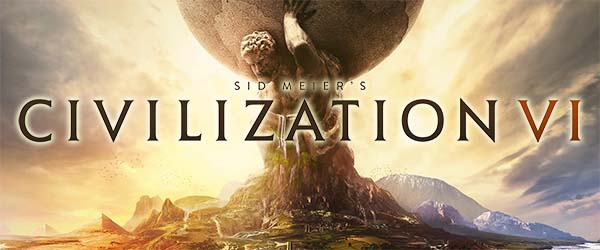
Civilization VI may look very similar to Civilization V at a glance, but once you start playing it, you're going to notice a lot of subtle differences. One of the most immediate differences will be the changes to unit-movement rules with respect to terrain. Units still travel on hexes, and terrain such as hills and forests still slow down movement, just as in the previous game. But this time around, the cost to enter a tile must be paid before entering that tile! This is a small, but significant change of rules that may force you to change the way that you explore the map.
The rewards of exploration are many, and finding these rewards is key to a good start.
Efficient exploration is key to getting off to a good start in Civilization. And a good start is key to success at higher difficulties and in competitive multiplayer. This is still true in Civilization VI. First and foremost, exploration will reveal valuable real estate for settling your first few cities, including resources, coast lines, and natural wonders. An efficient explorer will also be likely to uncover more tribal villages (i.e. "goody huts"), which will grant tech boosts, extra money, free units, or a head start towards founding your own pantheon. Efficient exploring will also introduce you to more city states, and you'll be more likely to be the first player to meet the city state. Being first to meet a city state will grant you a free envoy. This will grant you an immediate bonus depending on the type of city state, and it will put you one step closer to unlocking additional bonuses and becoming the suzerain of that city state.
So now that we've seen the rewards and benefits that await our exploration of the map, let's take a look at those new movement rules and how they'll impact our early exploration.
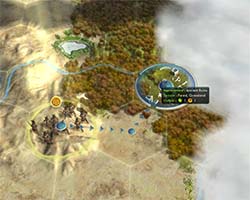
In Civ V it cost only one MP
to move onto rough terrain.
The rough terrain is even rougher
In Civ V, one movement point was all it ever took to move onto an adjacent tile. This meant that if a unit walked across flat land and had movement left, it could always enter rough terrain with its last movement point. Clever use of this rule would make it easier to cross jungles, climb a hill, or cross a river without any loss of speed. I would often move in such a way that my last movement point was used to cross a river or climb up onto a hill, and I would put priority (in Civ V) on trying to end turns on hills often, because doing so would allow my unit to see over other obstacles and give me a better lay of the land.
In Civilization VI, those tricks don't work anymore. The full cost to enter a tile must be paid prior to entering the tile. If the unit doesn't have enough remaining movement points to enter the tile, then the unit simply won't be able to enter that tile, even if it has movement points left. As in Civ V, crossing a river without a bridge will still consume all of a unit's available movement points, but unlike in Civ V, the unit will need to have more than one remaining movement point in order to attempt to cross. Depending on the layout of the terrain, this could mean that units will often be unable to use all of their movement points on a given turn. If you aren't planning for this and moving your unit(s) efficiently, then you could spend many more turns than necessary moving your unit across the map.
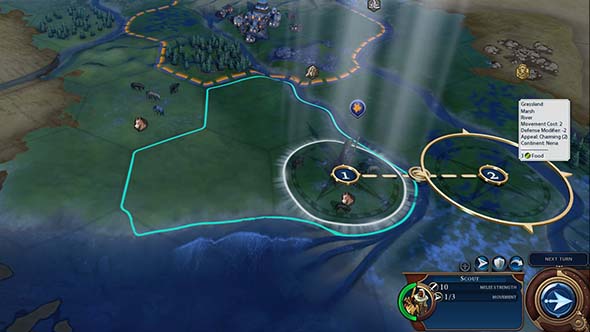
In Civ VI, you must pay the cost to enter a tile before entering it, and scouts do not ignore terrain cost
You might think that these rules could lead to situations in which a unit is incapable of moving. Don't worry, your units can't become hopelessly stuck. One exception to these stricter rules is that a unit that still has all of its movement points can always spend them to move to an adjacent tile, even if the cost to enter the tile is more points than the unit's maximum movement points. Your two-movement point warrior won't get hopelessly stuck the first time it encounters a forested hill.
Focus on moving across flat land whenever possible
Since you can't use loopholes to get around the higher cost of moving through rough terrain, it is now much more important to move along flat lands whenever possible. At the beginning of the game, you have only a single warrior with only two movement points. Try to cover as much ground as possible with this single warrior. I prefer to use my warrior to explore in a tight spiral pattern around my capital. This reveals all nearby resources, villages, and so on, and it also keeps your warrior close to your capital so that it can be used to defend your city from barbarians (more on that later) and to escort builders and settlers. If you send your warrior out exploring in a straight line, you'll be more likely to miss valuable real-estate close to your capital that might be good for settling, might miss nearby city states that could be valuable trade partners, and it'll take forever for you unit to return to your lands if you ever need to defend from attacks.
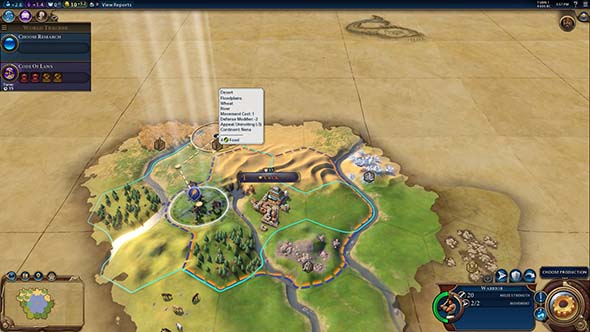
Your first moves with your warrior should probably be in the direction of flat land.
Scouts in Civ VI have three movement points, but they don't receive the "Ignore terrain cost" ability that the scouts of Civ V had. This means that your scouts will be slowed down considerably by rough terrain. Just like with your warrior, you'll want to try to keep your scout moving across flat land whenever possible in order to maximize how far it can travel. I'd recommend building two scouts early (unless you have very early unique units that you'd rather build instead), as this will allow you to quickly explore while still keeping your starting warrior close to your capital to defend against barbarians.
Every now and then, it can be worthwhile to take a detour onto rough terrain. Obviously, if you've run out of new flat land to explore, then entering rough terrain is a necessity. It might also be worthwhile to climb up onto a hill in order to see over other obstacles and determine if those obstacles are worth attempting to cross. There will also be times when crossing through hills or forests will be the quickest way past the obstacle, in which case, go for it.
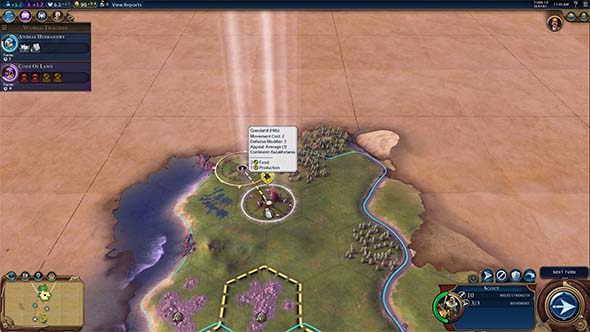
Sometimes, it can be worthwhile to climb up onto a hill to see over other obstacles.
Another change that will likely influence how you explore is that a civ's borders are no longer automatically closed. Instead, civs must research the "Early Empire" civic in order to unlock border enforcement. Before researching Early Empire, a civ's border will appear as a dotted line, and this means that you can cross through it with impunity. You can use this to explore within a rival civ's borders to scope out their cities or terrain, or to pass through to parts of the map that otherwise might be locked to you. Early Empire comes pretty early in the civics tree though, so it won't be long before borders start closing, and you might still end up getting your scout or galley trapped on the other side of a colored line drawn on the map.
Reaping benefits
Scouts in Civilization VI do not gain xp exclusively from combat anymore. They can now gain xp from exploring. Scouts gain xp when they uncover natural wonders, enter tribal villages, or meet new city states or civilizations. The first two promotions available for scouts allow that scout faster movement on hills or faster movement through forests/jungles. Take the promo that corresponds to the terrain that your scout seems to be encountering the most, and then focus your scout on moving through that type of terrain for its future exploration.
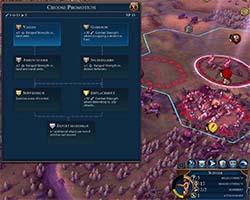
Taking a promotion heals the unit and ends its turn.
Taking a promotion now counts as an action for the unit, and so it requires that the unit have at least one remaining movement point, and it ends the unit's turn. They'll also heal your unit 50 HP (no more "insta-heal" promotion). Fortunately, you can save your promotions for later if you don't want to use it right away, but doing so prevents the unit from gaining additional xp until the promotion is spent. Since taking the promotion requires an action instead of the whole turn, you can possibly sneak in an extra move or two before taking the promotion. Hopefully, doing so doesn't uncover another natural wonder or something else that will provide a large chunk of xp that gets wasted because you haven't taken a promotion yet.
Your scouts are generally strong enough to withstand a couple attacks from barbarians, but you should try to avoid contact with barbarians whenever possible. If you see a village on the other side of an encampment, it might be better to send your scout somewhere else. You can send a small detachment of military to the encampment to clear it and claim the village later. But if you think you can sneak past unscathed, then go for it, especially if you already have promotions that will allow you to quickly traverse rough terrain and escape from barbarian pursuit.
Defending from barbarians
Barbarians in Civilization VI are much more disruptive than they were in Civilization V. The reason for this is that their behavior has been changed. In Civ VI, barbarians are more aggressive about attacking cities early in the game. They are scripted to send out scouts to explore the map and uncover the locations of cities. If a scout finds a city (you'll hear an audio cue if a barbarian scout finds one of your cities), it will return to an encampment. If it arrives at the encampment, it will "tell" the barbarians within where that city is, and the encampment will spawn a sizable raiding party to attack the city. If left unchecked, this can be extremely disruptive. These barbs will kill your units, capture your civilians, and pillage your improvements and districts. On the highest difficulties, barbarians can even capture and raze your cities!
Keep your starting warrior close. If you see a barbarian scout near your city [LEFT],
you'll need to kill it or be prepared for an imminent barbarian attack [RIGHT].
It isn't just the fact that they'll come at your cities in large numbers that causes problems. One other rule change from Civ V is that cities can no longer automatically bombard enemies. In order to bombard an enemy from a city, you must first research Masonry, and then construct a Wall around the city. Until then, your city has no way to counter attack invading barbarians.
This is why I recommend keeping your starting warrior relatively close to your capital. He'll be available to either kill a barbarian scout that finds your city, or to force the scout away and prevent it from finding your city to begin with. In a worst case scenario, that warrior will be there to help defend the city from a horde that the scout sends your way. But even with that starting warrior, you'll still need backup. Don't neglect building a few extra military units early - at least another warrior and a slinger or two.
If you are unable to stop the scout, then be prepared for a fight. It's more important in Civ VI to build up a sizeable army early in the game, since the barbarians pose much more of a legitimate threat to your expansion. If they pillage your improvements or districts, you'll need to invest in new builders to repair the damage. If the barbarians come for you, you'll want an army of 4-6 units waiting to fight them back. That should include two or three warriors (or spearmen if you have them) and at least one or two archers. Slingers can do in a pinch, but their measly range and weak strength means they don't stand up to punishment. The extra range of the archers makes them much more useful, and you should target researching archery very early if barbarians become a problem.
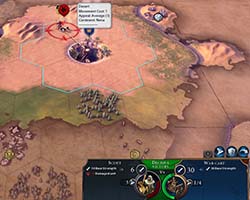
Early unique units like the Sumerian War Cart
are great for battling barbarians.
Some civs have very early unique units that also make excellent anti-barbarian task forces. The Sumerian War Cart is available form the start of the game and has melee strength on par with classical swordsmen! Its three movement points also means that it can pursue barbarian scouts more effectively than an army of warriors or slingers. The Egyptian Maryannu Chariot Archer is also a very potent unit on both defense and offense. It's fast, powerful, and has a ranged attack. It's a bit more expensive and has a tech prerequisite, so it's not as easy to build as the War Cart. But if you can get one or two out in the field, it can make mince meat of barbarians.
If you don't have access to such unique units, then you should invest in Heavy Chariots early. Chariots do not require horses to build, they're faster and stronger than warriors (in open terrain), and can be used to chase down barbarian scouts. If barbarians are proving to be a threat, then you should also prioritize the Military Tradition civic. Researching it will automatically grant flanking bonuses to your units (no policy needed!). This will allow you to deal more damage by surrounding enemy units. In open terrain, the extra mobility of Heavy Chariots will allow you to more easily surround your enemies and attain flanking bonuses.
Hopefully, this will allow you to fend off barbarian attacks. Be especially cautious of barbarian mounted units. A horde of warriors and slingers is not difficult to deal with as long as you have a handful of troops to defend you. But if the barbarians show up with several horsemen and horse archers, you can be in serious trouble, especially if you don't have spearmen out in the field.
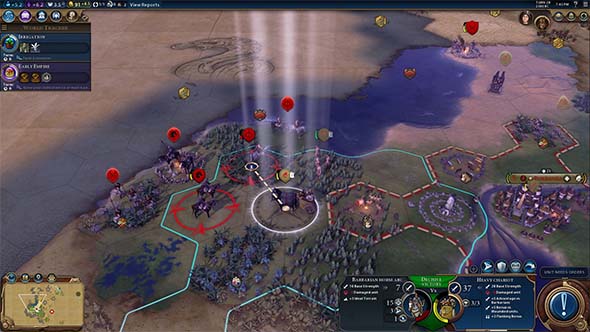
A horde of barbarian horse units can be daunting, but Heavy Chariots and flanking bonuses will help overcome them.
Scythia's ability to heal after killing an enemy unit also allows them to defend with fewer units.
I hope that these strategy suggestions help you to get off to a good start in your next Civ VI campaign. Happy Civ-ing! And I hope to see you back again when I release my full review of the game and post some civilization-specific strategy guides!